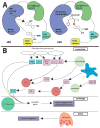The JAK-STAT pathway: impact on human disease and therapeutic intervention
- PMID: 25587654
- PMCID: PMC5634336
- DOI: 10.1146/annurev-med-051113-024537
The JAK-STAT pathway: impact on human disease and therapeutic intervention
Abstract
The Janus kinase (JAK)-signal transducer of activators of transcription (STAT) pathway is now recognized as an evolutionarily conserved signaling pathway employed by diverse cytokines, interferons, growth factors, and related molecules. This pathway provides an elegant and remarkably straightforward mechanism whereby extracellular factors control gene expression. It thus serves as a fundamental paradigm for how cells sense environmental cues and interpret these signals to regulate cell growth and differentiation. Genetic mutations and polymorphisms are functionally relevant to a variety of human diseases, especially cancer and immune-related conditions. The clinical relevance of the pathway has been confirmed by the emergence of a new class of therapeutics that targets JAKs.
Keywords: autoimmunity; cancer; cytokine; immunodeficiency; kinase inhibitors.
References
-
- Hacein-Bey-Abina S, Le Deist F, Carlier F, et al. Sustained correction of X-linked severe combined immunodeficiency by ex vivo gene therapy. N Engl J Med. 2002;346:1185–93. - PubMed
-
- Hacein-Bey-Abina S, von Kalle C, Schmidt M, et al. A serious adverse event after successful gene therapy for X-linked severe combined immunodeficiency. N Engl J Med. 2003;348:255–6. - PubMed
-
- Minegishi Y, Saito M, Tsuchiya S, et al. Dominant-negative mutations in the DNA-binding domain of STAT3 cause hyper-IgE syndrome. Nature. 2007;448:1058–62. - PubMed
Publication types
MeSH terms
Substances
Grants and funding
LinkOut - more resources
Full Text Sources
Other Literature Sources
Medical




